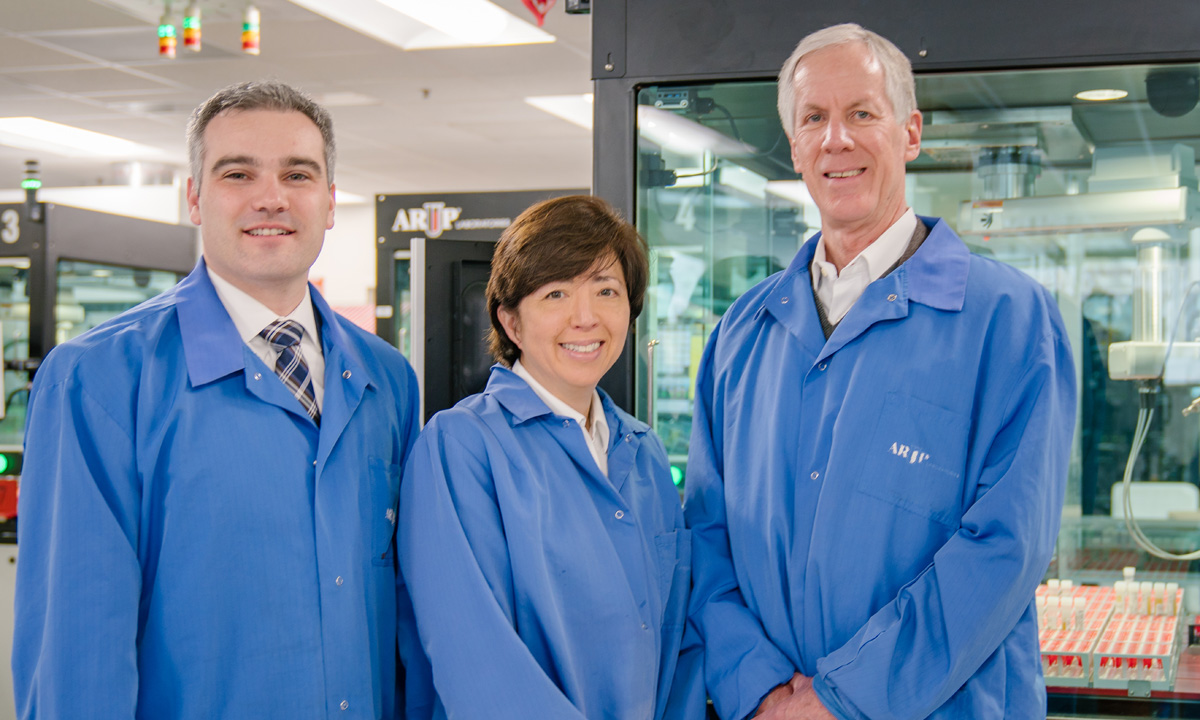
Earning ISO accreditation is an institute-wide effort. The team that guided ARUP through this accreditation included Janice Pinterics, quality manager; Jonathan Carr, director of Compliance, Quality, Privacy, and Risk; and steering committee member Dr. Ron Weiss, a professor of pathology at University of Utah and ARUP’s former president and COO.
“If I had six hours to chop down a tree, I'd spend the first four hours sharpening the axe.”
- Abraham Lincoln
ARUP recently earned the highly respected ISO 15189 status from the College of American Pathologists (CAP). In doing so, some would say ARUP sharpened its axe to the cutting edge – bringing six laboratory divisions, with over 70 individual labs, into close, coordinated communication and integrating a new system. “Given the test menu that ARUP offers, it is among the largest organizations to achieve ISO 15189-accredited status by the CAP. It’s impressive that an organization with so many laboratories has been able to unify those sections with best practices and effective ways of sharing information,” said Amy Pennock, the CAP lead assessor.
ISO is an international accreditation—and basically, the big time. It means that ARUP is very, very competent and has operational systems in place to back up that competency. “In clinical lab accreditation, this is a fairly new program (since 2008 from CAP), and we’re one of the largest labs to reach this stage. Before this, the accreditation had not gone to a laboratory of our size and high level of complexity. Receiving this is a significant achievement, setting us apart from other large organizations,” said Janice Pinterics, quality manager at ARUP.
Janice Pinterics“Before this, the accreditation had not gone to a laboratory of our size and high level of complexity. Receiving this is a significant achievement, setting us apart from other large organizations.”
Quality Manager
Pinterics spearheaded the movement toward harmonized changes along with Jonathan Carr, director of Compliance, Quality, Privacy and Risk and an ISO steering committee numbering about 15 individuals from departments including Technical Operations, Compliance & Quality Systems, Finance, Purchasing, Medical Directorship, and Human Services.
This all started with CAP’s initial assessment in August 2014, when ISO assessors sounded out any areas at ARUP where the laboratory would need to make adjustments and bring together systems to achieve ISO 15189. The process took perseverance and dedication from the lab’s many employees. “We were always good at identifying problems,” notes Carr, “But now we can be more effective at stopping them from repeating. Now our processes require us to prove to ourselves that the same mistake won’t happen again.”
What has changed?
A new system was integrated into the six lab divisions and throughout the organization. “Previously, we used a database to write up any problems and what actions we took to fix them, then cases were closed without review. For ISO accreditation, we significantly reconfigured the system to harmonize our method of investigating problems, and there was training for everyone for using it,” notes Pinterics. “The change required buy-in from multiple areas that were previously relatively independent—all six lab divisions worked with the CRM Salesforce team, IT, and CQS. We had to work out any issues in the new system and agree upon a harmonized approach for investigations and reviews.”
The lab worked together to achieve all this, notes steering committee member Dr. Ron Weiss, a professor of pathology at University of Utah and ARUP’s former president and chief operating officer. “I think ARUP’s history has always been focused on service quality and a commitment to excellence in healthcare. Achieving this status just further validates the value that everyone here places on the work that they do for patients. They want to do it with the highest quality possible.”
Putting a system in place to hear more from each employee was also part of that change–and something that ARUP achieved with great effect, notes Pennock. “In order to ensure consistency of work, communication needs to be fostered. It’s important that staff be heard and truly listened to—and where actionable, that action is taken. It has been truly striking to me, professionally, to see the ways that ARUP has made it possible for the staff to be heard.”
Catherine Arnold, Science Communications Writer
















